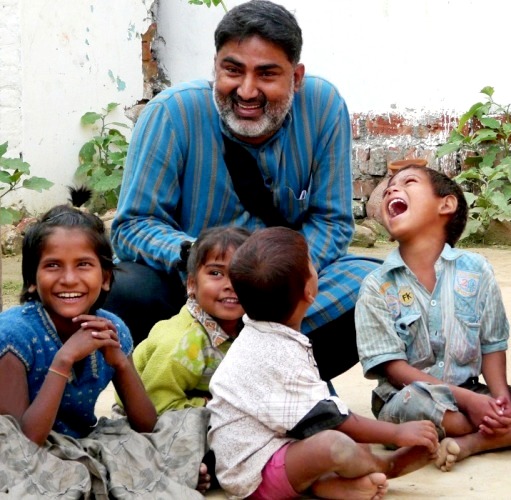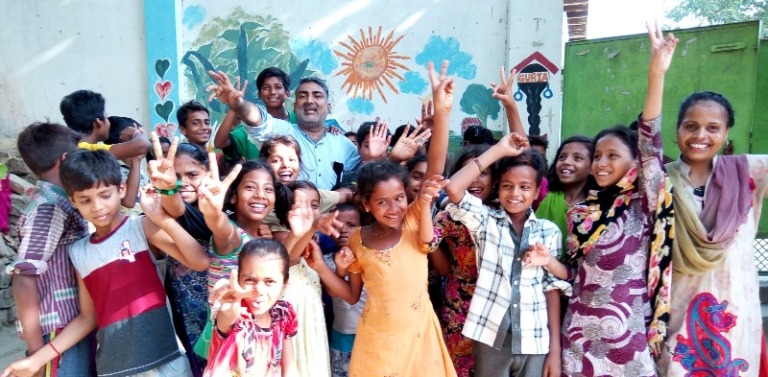Sex trafficking is an issue which affects the most vulnerable girls of the society. The life of a sex worker is marred with helplessness, fear, shame and poverty- all of which force them into a neverending cycle of trading their dignity for sheer survival. Sex workers are one of the most marginalised, stigmatised and mistreated section of women and their plight still remains largely unheard.
for sheer survival. Sex workers are one of the most marginalised, stigmatised and mistreated section of women and their plight still remains largely unheard.
One of the foremost individuals who have taken this issue head on is Ajeet Singh and his organisation Guria India. Ajeet has been working tirelessly and fearlessly the past 35 years- rescuing victims of sex trafficking, supporting their rehabilitation/reintegration, fostering awareness through education and trainings, taking up legal battles against perpetrators and advocating for policy level shifts. His efforts have been recognised by numerous international insitutions, government bodies and even celebrities including Amitabh Bacchan. Infact, he was invited as a special contestant on Bacchan’s show Kaun Banega Crorepati to raise awareness on sex trafficking.
TheCSRUniverse reached out to him after the anouncement of the HCL Grant this year where his organisation was a finalist. In this interview, Ajeet Singh, Founder & Director of Guria Swayam Sevi Sansthan, talks in detail about his 35 year long journey, the challenges & learnings, their successful model and end-to-end strategy that has taken shape after years of experience.
Scroll down to read the full interview:
Q. You were a finalist for the HCL Grant in the domain of Education. Do you have any specific education project or initiative for which the grant would be utilised?
A. The HCL grant would be utilized for a project named ‘Prevention of sex trafficking by supplementing mainstream education of at-risk girls’. The total budget for the project is INR 25,69,000 out of which 25,00,000 has been supported through HCL grant.
Q. Guria has a formidable list of awards and endorsements. How far have these recognitions strengthened the organisation’s prospects in terms of collaborations or funding?
A. Since Guria focussed on a single issue of sex trafficking, the availability of funds has always been limited. None the less, the awards have helped in the recognition of the issue along with Guria which together has made our task easy in terms of funds (HCL, Kanpur Logistics, Azim Premji Foundation) and collaborations. This will help us replicate our successful model involving prevention, protection, prosecution and rehabilitation/re-integration within the framework of Guria’s innovative holistic end-to-end strategy.
Q. You would be aware of the CSR Act passed in 2013. Have you noticed any noteworthy change in funding received by your organisation since the Act came into play?
A. Above all the quality/nature of funding is more important. Mostly support is very short term, result-oriented rather it should be impact driven. Fortunately we have Azim Premji Foundation and HCL funds which have long term vision along with compassionate services.
Q. You have been actively involved in prevention of child prostitution and trafficking for over three decades. What were the biggest challenges you faced when you started and what are the biggest challenges today?
A. The initial challenges included social discrimination as well as retaliation from family, friends, donor fraternity etc. Being one of the pioneers on the issue of combating sex trafficking, I did not get much support for working on a new, complex tabooed issue involving the most marginalized women and children in sex trade. Besides these, there were several dilemmas such as:
- Choose to work at source level or transit level or destination level with limited resources
- Education through art-therapy or mainstreaming children in schools or do both in parallel
- Whether to continue with condom distribution (for high risk group) which were being used on trafficked minor girls or to focus on rescue to end child exploitation or both in a judicious way
- Whether to carry ahead charity work on education, health etc. in isolation and produce more educated and healthy girls in sex trade or take the criminal structural roots of prostitution head-on through a holistic end-to-end strategy
- Whether to attack the traffickers/brothel keepers/pimps first or attack the corrupt police/administration to make a dent in the organized criminal nexus
- Whether to spread the limited resources too thin to meet the needs of many or to pour more into a single case
- Amidst scarcity should we compromise with donors, the state machinery and the criminal nexus
- Whether to continue pushing for justice in individual cases within the same corrupt criminal justice system and set precedents OR to advocate for changes at policy level and highlight state’s incompetence through the public interest litigations where the response of the higher courts has been lethargic OR both together
- Whether to continue working in a stereotypical charity mode as per donor programs and government wishes or move ahead with innovative holistic end-to-end strategy beyond program budgets, targets and timelines
Today’s challenges are different. How to carry forward this model through scaling up/replication and how to sustain it institutionally? Also, how to move from practice to policy in terms of rescue of minors and conviction. Even today to a great extent, good work is limited to the personal interest of officers. Now after a 35 year long journey of working on a single issue of sex trafficking, the major issue before us is the second line/successor. Certainly the core team breaks all limits of devoted service as my partner, but as naked individuals the team still doesn’t craft solutions organically.
Q. You would have collaborated with civic and local bodies for your work over the years. How has your experience been?
A. Guria’s own understanding about respecting all the civil and human rights and de-criminalizing individual women in the red-light areas along with the recent Supreme Court guidelines has helped us to ensure the access of government entitlements for the women in sex trade. We have organized several camps with the district authorities for making of ration cards, voter cards, widow pension, old age pension, labour card, ayushman card etc. for the women both in the red-light area as well as the vulnerable villages in the source areas.
Whereas we still have mixed experience with police and administration – sometimes we have found very supportive, understanding and proactive officers like in Allahabad which led to the historic rescue of 136 victims, seizure of 61 brothels and arrest of 48 accused. Here, we also created a national record with the conviction of 41 traffickers/brothel keepers in a single case of sex trafficking which set a precedent of best coordination among NGO, Police and administration. At times we had issues in filing FIRs, investigation, compensation to the survivors, trials in the court etc.
Q. Do you think the current discourse around women empowerment addresses the plight of young girls and women that you work with?
A. Academic discourses don’t match the implementation of the laws against the traffickers/brothel keepers. But certainly Supreme Court and NGOs perspectives have changed. They are no more targeting the women in sex trade as accused. The failure of enforcement is well revealed in the NCRB data reflecting 90% acquittal and 87% pendency rate in trafficking cases and 95% pendency rate in cases of crime against women whereas on the other side we have the highest number of people living in slavery. Criminal Justice System has to be further streamlined to fight back the criminal nexus involving procurers-traffickers-brothelkeepers-pimps-police.
Q. Have campaigns like “Beti Bachao, Beti Padhao” been able to bring any noticeable shift in rural and educationally backward communities?
A. Government has taken up good initiatives and they have even reached the last person but again the major issue in the vulnerable villages is who will implement solutions at the grassroots? Corruption, casteism, nepotism, illiteracy and impunity is still the main problem amidst the marginalized communities since they can’t afford to question.
Q. What do you think are the biggest roadblocks when it comes to empowering women at the bottom of the socio-economic pyramid? What could be the best course of action to address these issues?
A. Looking at the present status of women even after 75 years of independence, the biggest road-blocks have been poverty, illiteracy, unemployment, social customs, anti-female mind-set. These have been coupled with biased in-spirit implementation of laws, schemes, guidelines, GOs against women in general and women in commercial sex in particular by the male-dominated society. Women have to additionally carry the triple burden of class, caste and gender simultaneously. To sum-up, women are still not able to avail the socio-economic-political rights enshrined in the constitution.
Q. In your opinion, what steps could be taken at the policy level to create an ecosystem of equality and empowerment for women in general and the girl child in particular?
A. Government has number of schemes so we don’t need new schemes at present. To be very specific women/girls should be reserved as 50% beneficiaries in all existing government programs. Secondly, quality education and health services for the women and girls should be ensured at the grassroots level. Thirdly as a rule, considering women as a major human resource, government must invest in the already left-out female population to ensure a dignified standard of living which will help the nation to grow and prosper because communities are still struggling for survival with 5kg ration and are not in a position to pay back to the nation with full potential. Only political empowerment with one vote for one woman is not just enough. We as a nation must also focus on the social and economic equality and empowerment of women. Additionally implementation of criminal justice system must be more sensitive towards women.
Q. Would your organisation be focusing on any specific areas or projects in the next 2-3 years?
A. As decided at the very inception, we have always focussed on a single issue of fighting sex trafficking and sexual exploitation of women and children for the past 35 years and all our projects would be focussed on this topic itself in the coming future. Further, while continuing all the present activities in line with our holistic end-to-end strategy, we want to focus more on prevention of sex trafficking and strengthening of the status of vulnerable women and children, so as to make them resilient, self-reliant and create a sustainable impact with ownership of the community.





 for sheer survival. Sex workers are one of the most marginalised, stigmatised and mistreated section of women and their plight still remains largely unheard.
for sheer survival. Sex workers are one of the most marginalised, stigmatised and mistreated section of women and their plight still remains largely unheard.












.jpg)



